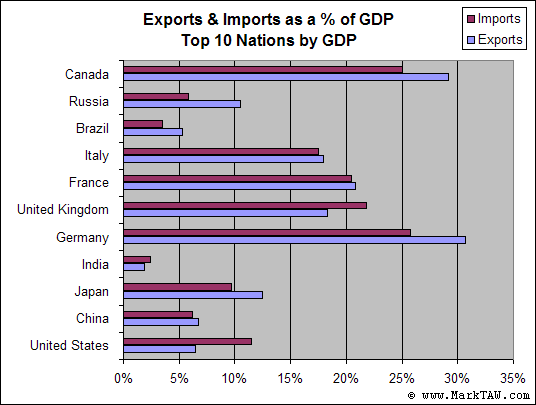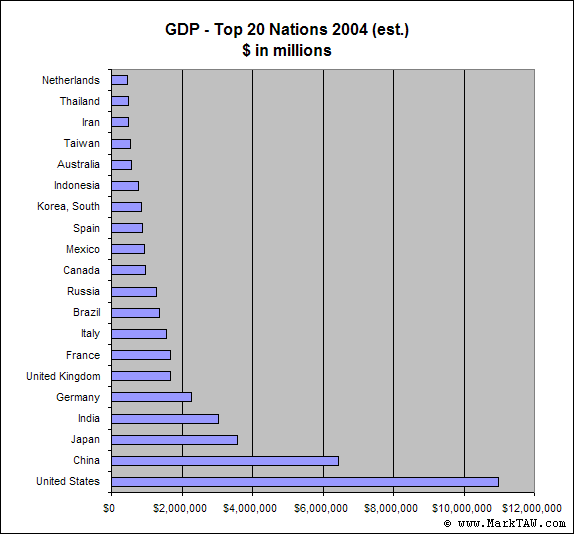

|
| weblog/wEssays | home | |
|
Meltdown in the E.U. (June 2005) These two charts reveal what's fundamentally wrong with the European Union: the economies of Germany, France and Italy are far too dependent on exports. As a result, they face three insurmountable problems: 
Canada is also heavily dependent on exports, but these are largely commodities: timber, grain, minerals and petroleum. The U.K. is also vulnerable to any slowdown in its exports. So who are these countries depending on to buy all their exports? Just look at the two largest economies of the world: 
Unsurprisingly, The E.U. depends very heavily on exports to the U.S. and to China. As a result, they are exquisitely vulnerable to any slowing in either economy. But consider who China depends on to support its enormous export economy: the U.S. The charts reveal the dominance of the U.S. economy, and that it is the end market for a significant chunk of the exports not just of the E.U but also of Japan, Southeast Asia and China. The entire world is propped rather unsteadily on the back of the U.S. consumer--yes, that over-indebted idiot freely spending his home equity line of credit. So the line of dominoes is now very clear: most of the world depends very heavily on exporting to the U.S., especially those economies whose lifeblood is exports. The U.S. consumer has been able to buy the entire world's exports by draining his home equity, which has been rising due to the global housing bubble, which is dependent on cheap and plentiful mortgages. Now we can see how the dominoes will fall: any tightening in money or interest rates will choke off the housing boom, ending the U.S. consumer borrowing spree which has supported the entire world economy. Please don't tell me the housing boom and cheap mortgages can go on forever, because nothing goes on forever--especially a system this imbalanced. Who's enabing the low interest rates? The Japanese and Chinese central banks, by recycling their dollars into U.S. Treasury bonds. Where do they get all those dollars? By exporting boatloads of stuff to the U.S. consumer. What happens if the consumer stops buying? Then they don't have any more dollars to buy Treasuries, and U.S. interest rates go up. The feedback loop changes from positive to negative in a New York minute. OK, enough economics. I promise to cover something else. But this, along with global climate change and environmental degradation, is one of three key issues facing the world community. The collapse of the U.S. housing boom isn't just going to affect some distant economy--it will affect every economy and every person in that economy. * * * copyright © 2005 Charles Hugh Smith. All rights reserved in all media. I would be honored if you linked this wEssay to your site, or printed a copy for your own use. * * * |
||
| weblog/wEssays | home |